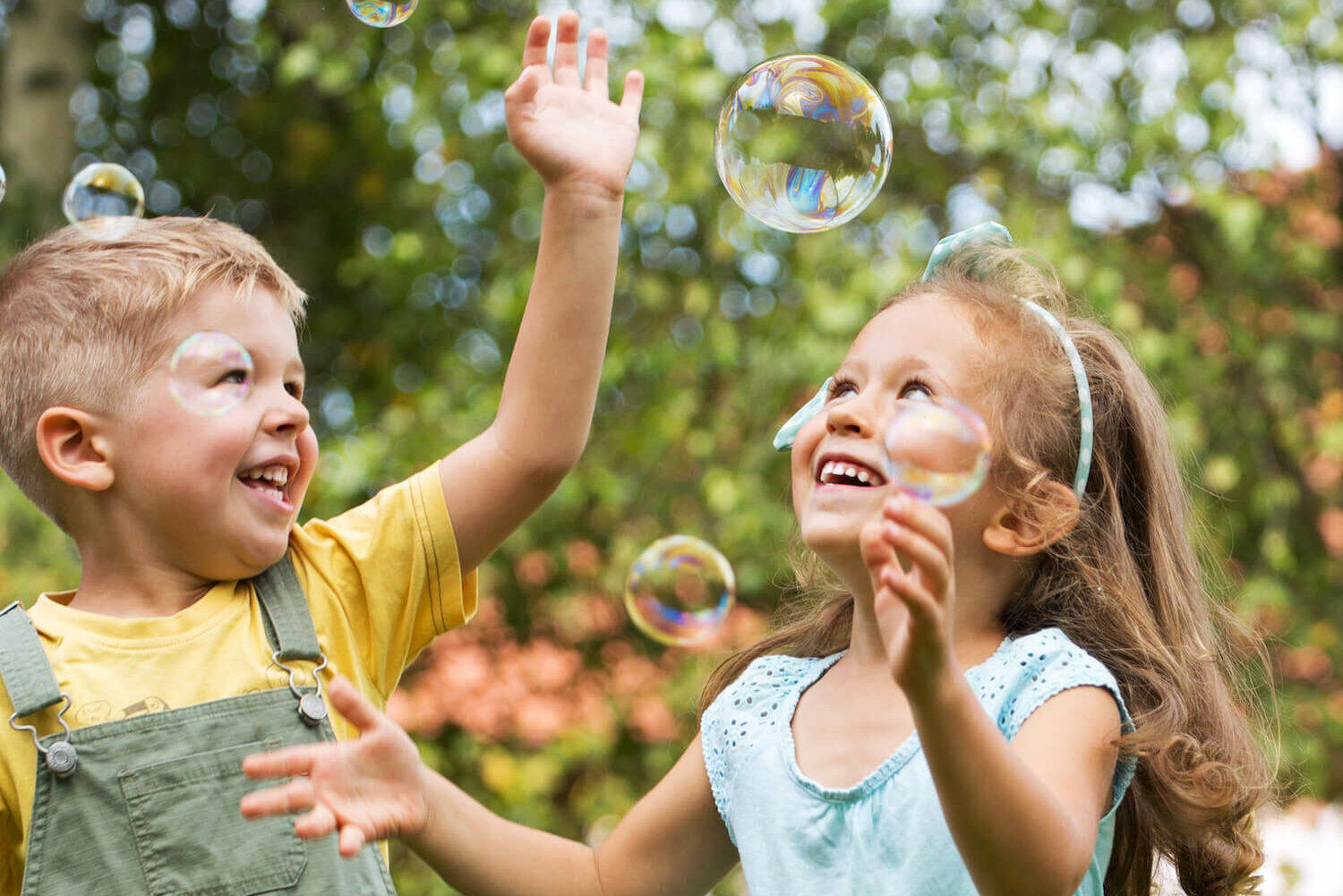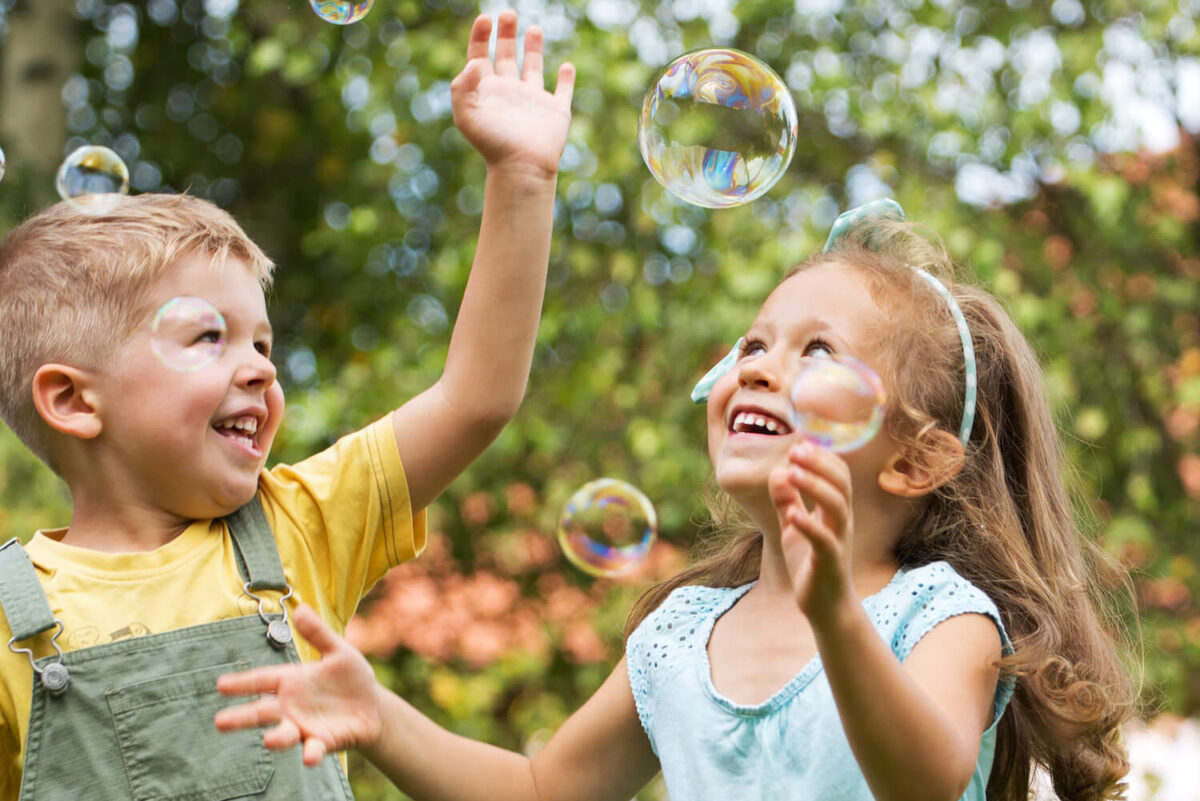
When Will My Child Make Friends?
Few things are cuter than a couple of babies who seem to be playing together. Or a baby playing with a dog, for that matter. But when do young children actually start making friends? We asked Pamela Segel, a Developmental Specialist with Abrazos Family Support Services, to walk us through some key skills children develop on the road to making their first bestie, and how families can support them.
First, our top three tips:
1. Model friendship skills in your own relationship with your child. Behaviors like sharing, taking turns, or checking on someone who seems sad are all habits your child can start building at home, and they’ll eventually translate to the playground.
2. Don’t force children to have social interactions that make them uncomfortable or that they don’t seem ready for. If they have a bad experience socializing with peers, they may not want to do it again. Let them hang back and join at their pace.
3. If you have any concerns or gut feelings about your child’s social or emotional development in their first three years of life, you can get them a free screening with the FIT program. A screening checks for developmental delays, and you’ll get free services if a delay is found. It’s always better to know than to wonder, and getting services early is more effective than getting them later.
Foundations at Home
The path to friendship in early childhood begins with a baby’s first relationships at home. Even before children have experiences with peers, Pamela said they are learning from their primary caregivers about how to relate to other humans. Warm, responsive relationships with family members teach children that social interactions are safe and that someone will be there to comfort them if something unexpected happens. You can build this through serve and return interactions, which means having “conversations” with babies even before they can form words. Giggles, snuggles, and providing comfort when babies are upset are all part of building that strong foundation for future friendships.
Alone but Together
In general, babies and young toddlers don’t play fully together—so don’t worry! If you put two 8-month-olds next to each other for a baby “playdate,” Pamela said they will mostly do their own thing (which is to say, put things in their mouths). Play at this age may consist of picking things up, tossing objects to see what happens, or maybe even handing toys back and forth. Depending on how much time kids have spent around other young children, they may be cautious or hang back with their trusted grownups. That’s OK! They’re learning that it’s safe for them to meet new people, and a grownup will be there for them if they get nervous.
Parallel Play
Toddlers generally engage in something early childhood experts call parallel play. “Parallel play is, we’re sitting together … I’m going to play with my own set of toys here, but I’ll let you into my space,” Pamela said. By the time children are about two-and-a-half, one of their expected social milestones is playing next to other children, and sometimes with them. Children who reach this milestone are generally able to tolerate the noise and movement of other children around them without regularly becoming agitated or withdrawing from the situation. The toddler stage is also when sharing gets hard and everything becomes “mine!” (even that piece of crumpled up paper that was not interesting until someone else touched it). If hosting a toddler playdate at your house, consider putting away favorite toys that will be hard to share, and putting out more shareable toys, like blocks.
BFFs
When children are about four years old, they’ll start to truly play together in more complex and cooperative ways. Four-year-olds can set up a game with different roles (like playing house), and some children may lead the play while others follow along. When conflicts arise in games, children this age may be able to work them out on their own. However, it’s important for adults nearby to notice if a child is pulling away or becoming agitated, so they can help the child feel emotionally safe in the situation. Pamela said young children experience social nervousness just like adults, and scan their environments the way a grownup might scan a party or social gathering for a familiar face. Receiving comfort from a caring adult helps children relax into the party—or the playdate.
Effects of COVID
The COVID-19 pandemic meant that many young children had fewer chances to socialize than they might have otherwise. There’s a lot we don’t know yet about what that means for children, but Pamela said specialists like her are seeing more developmental delays than they used to. The good news? Kids are really good at bouncing back, especially if we give them lots of chances to practice their skills. If it’s a good fit for your family, consider enrolling kids in a high-quality child care setting (it’s free or nearly free for more families than ever before!) or in New Mexico PreK if they will be three or four at the start of September. Or if more formal settings aren’t a good fit, children can build their social skills at playgrounds, libraries, and family gatherings with cousins.
Things to Watch For
All children develop at their own pace and have different personalities. However, Pamela also described some possible signs that a child might need some extra social support. Preferring to play alone most of the time can be a sign, but not always. Pamela said it’s important to notice whether a child goes off by themselves in all settings, or only sometimes. If they are shy at the park but chatty and social at family gatherings, they may just be cautious around new people. But if they consistently play only away from other children or with the same set of predictable toys, families might want to get them screened for FIT services. FIT also may be able to help if a child’s interactions with other children regularly lead to aggressive behaviors like hitting or yelling. If you aren’t sure, a free screening can get you peace of mind, plus a team of experts to help you if the screening identifies a need.

Ready for a free developmental screening?
Learn more here about FIT and now to apply. FIT supports are always free and are scheduled at your convenience.

